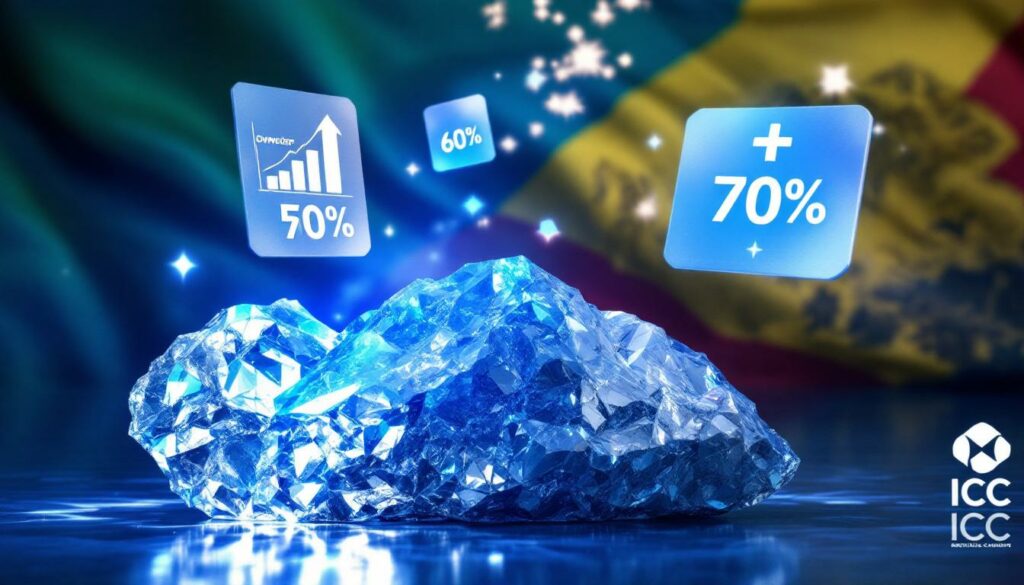Understanding the ICC Decision on AVZ Minerals' Acquisition of Dathomir's Shares
The International Chamber of Commerce (ICC) ruling confirmed AVZ Minerals Limited's legal acquisition of a 10% stake in Dathcom Mining SA, resolving a dispute over share ownership central to the Manono lithium and tin project's development. This landmark decision validates the 2020 Share Purchase Agreement (SPA) and establishes AVZ's majority control (70%) of one of Africa's most significant lithium resources. The award mandates a $15 million payment to Dathomir while leaving open a separate claim for an additional 5% ownership. This outcome provides legal certainty for AVZ's project advancement amid growing global demand for battery metals investment, though regulatory challenges in the Democratic Republic of Congo (DRC) and pending arbitration proceedings remain critical factors for the project's future.
What Was the Key ICC Ruling in the AVZ-Dathomir Dispute?
The International Chamber of Commerce (ICC) recently issued a landmark decision confirming that AVZ Minerals Limited legally acquired a 10% shareholding in Dathcom Mining SA. The ruling, delivered through arbitration proceedings, validated that AVZ's wholly owned subsidiary, AVZI, became the rightful owner of these shares as of August 13, 2021, in accordance with the terms of the Share Purchase Agreement (SPA) executed in 2020.
The decisive ICC award marks the culmination of a multi-year legal battle over ownership rights that threatened to delay development of one of Africa's most promising lithium resources. By confirming the validity of the 2020 SPA, the tribunal established clear legal precedent for enforcing cross-border mining agreements in the region.
According to the arbitration findings, AVZI must organize payment of $15 million to Dathomir, representing the balance of the price agreed under the 2020 SPA. This payment will complete the financial obligations outlined in the agreement and formally conclude the transaction that began nearly five years ago.
The Timeline of the Acquisition Process
- Share Purchase Agreement signed in 2020, establishing terms for the 10% stake transfer
- Official transfer of shares completed on August 13, 2021, though subsequently disputed
- ICC arbitration proceedings initiated to confirm the legality of the transfer after ownership challenges
- Final award issued in July 2025, confirming AVZ's legal acquisition after extensive deliberation
The arbitration process involved detailed examination of documentation, contractual compliance, and procedural adherence during the share transfer. The tribunal's decision supports the binding nature of SPAs in cross-border mining transactions when properly executed, providing valuable precedent for similar disputes in the region.
Financial Implications of the Decision
The $15 million payment requirement represents a significant but anticipated capital outflow for AVZ. This financial obligation was accounted for in AVZ's project planning, though the timing of the payment following arbitration created some uncertainty in cash flow projections.
The resolution of the financial terms provides clarity for AVZ's investors and potential project partners who previously faced uncertainty regarding the company's ownership position and outstanding liabilities. This financial clarity is particularly valuable as the company advances toward project development and seeks additional capital for construction.
How Does This Decision Impact AVZ's Position in the Manono Project?
The ICC ruling solidifies AVZ's controlling position in one of Africa's most strategic lithium resources. With confirmed 70% ownership of Dathcom Mining SA, AVZ now has unequivocal majority control over decision-making processes, including development timelines, operational strategies, and partnership structures.
This ownership clarity allows AVZ to accelerate discussions with potential offtake partners, financiers, and technical contractors who previously hesitated due to ownership uncertainties. The company can now confidently engage in negotiations from a position of legal certainty regarding its stake in the project.
The confirmed 70% ownership also strengthens AVZ's negotiating position with the DRC government regarding permits, licenses, and development approvals. With majority ownership established, regulatory discussions can progress with greater confidence on both sides.
Current Ownership Structure
- AVZ Minerals now holds a confirmed 70% stake in Dathcom Mining SA
- Dathcom is the legal title holder of PR13359, containing the Manono lithium and tin project
- The remaining 30% ownership distribution among minority shareholders now faces less legal ambiguity
- This majority stake gives AVZ significant leverage in securing lithium supply and offtake agreements
The Manono project's strategic location in the DRC provides access to established mining infrastructure while positioning the operation to benefit from regional integration initiatives designed to facilitate mineral exports from Central Africa.
Pending Additional Ownership Claims
A separate arbitration proceeding (ICC No. 27425/SP) remains pending, commenced by AVZ against Dathomir. In this case, AVZ is seeking confirmation that it validly acquired an additional 5% shareholding in Dathcom pursuant to a separate SPA executed in 2019.
If successful, this additional claim would increase AVZ's ownership to 75%, further strengthening its control over the project and reducing the influence of minority shareholders in key decisions. The hearing date for this proceeding has not been set but is expected later in 2025.
The outcome of this second arbitration could have significant implications for project governance, with the 75% threshold often providing additional rights in shareholder agreements and reducing the potential for minority shareholders to block certain corporate actions.
What Makes the Manono Lithium Project Significant?
The Manono project represents one of Africa's largest and highest-grade hard rock lithium resources, positioned to become a cornerstone of global lithium supply as demand accelerates. Located in the mineral-rich DRC, the project benefits from the country's established mining sector while facing the challenges common to operating in emerging markets.
With spodumene-rich pegmatites averaging 1.65% Li₂O based on historical drilling, Manono offers extraction economics that compete favorably with global peers. The project's dual lithium-tin mineralization provides revenue diversification potential that enhances economic resilience against commodity price volatility.
The DRC's position as host to over 50% of global cobalt reserves has already established the country as critical to critical minerals energy transition. Manono's development would further cement the nation's importance in the energy transition materials sector.
Strategic Importance of the Asset
Manono's strategic value extends beyond its resource size. The project represents a significant diversification of global lithium supply, which currently remains concentrated in Australia, Chile, and China. As automotive manufacturers and battery producers seek supply chain resilience, geographically diverse projects like Manono gain additional strategic importance.
The lithium market is projected to experience a 500% demand increase by 2030, driven by electric vehicle adoption and grid-scale energy storage deployment. Manono's potential production capacity could supply approximately 5% of global lithium demand, making it a tier-one asset in the battery metals space.
For the DRC, the project represents an opportunity to capitalize on the energy transition beyond its established cobalt industry. Successful development would establish the country as a multi-mineral supplier to battery manufacturers, potentially attracting downstream processing investments.
Market Context for Lithium Projects
The global mining landscape has experienced significant volatility in recent years, with lithium prices surging to record highs before moderating as new supply entered production. However, long-term demand forecasts remain robust, with lithium requirements for electric vehicles and stationary storage expected to outpace supply growth through 2030.
Africa has emerged as an important region for lithium exploration and development, with projects advancing in Zimbabwe, Mali, Namibia, and Ghana. However, Manono's scale distinguishes it from many of these emerging projects, with resource estimates suggesting potential for multi-decade production.
The project faces competition from expanding production in established jurisdictions and new developments globally. However, its grade, scale, and relative advancement in the development pipeline position it favorably against many competing projects still in exploration phases.
What Are the Legal Implications of International Arbitration in Mining Disputes?
The AVZ-Dathomir case highlights the growing importance of international arbitration mechanisms in resolving complex mining disputes, particularly in jurisdictions where local legal systems may lack experience with sophisticated mining contracts or face challenges in delivering timely resolutions.
The ICC arbitration process provides a neutral forum governed by well-established procedural rules, offering greater predictability than navigating individual national court systems. For mining companies operating across multiple jurisdictions, this standardized approach reduces legal uncertainty and risk.
Mining disputes constitute approximately 25% of ICC's caseload, reflecting the industry's reliance on these mechanisms for resolving conflicts involving substantial investments. The enforceability of awards across 170+ countries under the New York Convention further strengthens their practical value.
Role of ICC in Resolving Mining Conflicts
The International Chamber of Commerce serves as a neutral arbiter in cross-border commercial disputes, providing a structured framework that balances contractual rights with jurisdictional considerations. For mining companies operating in regions with evolving regulatory environments, this neutrality offers important protection against unpredictable local judicial outcomes.
The ICC's specialized expertise in handling complex commercial matters ensures arbitrators possess the technical knowledge required to evaluate mining agreements, ownership structures, and performance obligations. This specialized competence contrasts with local courts that may lack experience with international mining transactions.
The binding nature of ICC awards provides finality to disputes that might otherwise persist through years of appeals in domestic court systems. In the DRC, where court proceedings often extend 3-5 years, arbitration offers a significantly expedited resolution path.
Enforcement of Arbitration Awards
The enforceability of ICC arbitration awards represents one of the mechanism's greatest strengths. Under the New York Convention, signatory countries (including the DRC) commit to recognizing and enforcing foreign arbitral awards, subject to limited exceptions.
This international enforceability creates a critical advantage over domestic court judgments, which may face challenges when enforcement is sought across borders. For mining projects involving international investors, lenders, and offtake partners, this enforcement certainty reduces project risk.
The AVZ-Dathomir case demonstrates how arbitration can effectively resolve ownership disputes without requiring parties to navigate multiple judicial systems or reconcile potentially contradictory judgments from different jurisdictions.
What's Next for AVZ Minerals After This Decision?
With ownership certainty established, AVZ faces several immediate priorities to advance the Manono project toward development. The company must organize the $15 million payment to Dathomir while simultaneously preparing for the pending arbitration regarding the additional 5% stake.
Beyond these legal matters, AVZ can now accelerate project development activities with greater confidence. This includes finalizing feasibility studies, advancing permitting processes with DRC authorities, and engaging more definitively with potential financial and strategic partners.
The resolution of the ownership dispute removes a significant obstacle to project financing, potentially accelerating timelines for bringing Manono into production. However, challenges remain in navigating the DRC's regulatory environment and securing the substantial capital required for project construction.
Project Development Outlook
With confirmed majority ownership, AVZ can now finalize technical studies and advance engineering designs with greater certainty. The company's feasibility studies, expected in 2026, will provide detailed capital and operating cost estimates that form the foundation for financing discussions.
Regulatory approvals from DRC authorities represent another critical path item, with mining licenses and environmental permits typically requiring 6-18 months for processing post-arbitration. AVZ's established presence in the country and the project's potential economic benefits should support these discussions.
Financing discussions, which had been complicated by ownership uncertainties, can now proceed based on clear equity structures. The company will likely pursue a combination of strategic partnerships, offtake agreements, and traditional project finance to fund the substantial capital requirements.
Remaining Legal Challenges
While the main ownership dispute has been resolved, the pending ICC arbitration (No. 27425/SP) regarding the additional 5% stake remains a significant legal consideration. The outcome will determine whether AVZ's control increases to 75%, potentially influencing governance structures and partnership negotiations.
The company must also navigate the complexities of the DRC's revised mining code (2018), which includes requirements for community development agreements and state equity participation. These regulatory considerations will shape project economics and operational parameters.
Establishing clear operational control following the ownership confirmation will require updating joint venture agreements, management structures, and decision-making protocols to reflect the validated ownership percentages and authority distributions.
How Does This Case Reflect Broader Trends in African Mining?
The AVZ-Dathomir dispute exemplifies several important trends reshaping the African mining landscape, particularly for battery metals projects. These include increasing competition for strategic resources, evolving ownership structures that balance local participation with international investment, and the growing reliance on international arbitration to resolve disputes.
Battery metal projects in Africa attracted approximately $7 billion in foreign direct investment in 2024, with lithium accounting for 40% of this capital inflow. This surge reflects the strategic repositioning of mining companies and investors seeking exposure to energy transition minerals.
The case also highlights the tension between "resource nationalism" policies that promote greater local ownership and the need for contractual certainty to attract international capital. ICC mechanisms help balance these competing interests by upholding contracts while respecting state sovereignty.
Evolving Investment Landscape
Africa's battery metals sector has experienced a significant transformation as global investors recognize the continent's geological potential for supplying critical minerals. This has led to increased competition among international mining companies for control of lithium assets across multiple jurisdictions.
The complexity of ownership structures has increased as projects incorporate multiple stakeholders, including governments, local partners, and international investors. This multi-party approach creates governance challenges but can strengthen projects by aligning diverse interests when properly structured.
International arbitration has become increasingly important as ownership disputes have accompanied the surge in battery metals investment. Approximately 65% of major mining disputes in Africa since 2020 involved ownership conflicts resolved via international arbitration, reflecting the mechanism's growing acceptance.
Governance Considerations in African Mining Projects
The AVZ case underscores the importance of clear contractual frameworks in cross-border mining ventures. Ambiguity in share purchase agreements, transfer procedures, or conditions precedent creates vulnerability to disputes that can delay project development for years.
International arbitration provides investor confidence by offering a neutral forum for dispute resolution, particularly important in jurisdictions where legal systems may lack experience with complex mining transactions or face resource constraints.
The challenge of navigating multiple legal jurisdictions remains significant for mining projects with international ownership. Companies must balance compliance with host country regulations while preserving the protections afforded by international investment treaties and arbitration provisions.
FAQs About the AVZ-Dathomir Dispute Resolution
What was the core issue in the AVZ-Dathomir dispute?
The dispute centered on whether AVZ Minerals' subsidiary AVZI had legally acquired a 10% shareholding in Dathcom Mining SA through a Share Purchase Agreement executed in 2020. Dathomir challenged the validity of this transfer, contending that certain conditions of the SPA had not been fulfilled. The ICC arbitration was necessary to determine whether the share transfer had been properly executed according to the agreement terms.
How does this decision affect AVZ's control of the Manono project?
The ICC ruling confirms AVZ legally holds at least 70% of Dathcom Mining SA, which owns the Manono lithium and tin project. This majority ownership gives AVZ significant control over project development decisions, financing arrangements, and strategic direction. The confirmation removes a major obstacle to project advancement by providing legal certainty regarding control structures and decision-making authority.
What is the significance of the pending 5% ownership claim?
AVZ is seeking confirmation through separate ICC proceedings that it validly acquired an additional 5% stake in Dathcom through a 2019 SPA. If successful, this would increase AVZ's ownership to 75%, further strengthening its position in the project. The 75% threshold often provides additional governance rights in joint venture agreements, potentially reducing the ability of minority shareholders to influence or block certain corporate actions.
What makes the Manono project valuable in the global lithium market?
The Manono project represents one of Africa's largest lithium resources, with high-grade spodumene deposits averaging 1.65% Li₂O. Its scale positions it to potentially supply approximately 5% of global lithium demand as electric vehicle production accelerates. The project's dual lithium-tin mineralization provides revenue diversification potential, while its location in the DRC establishes it as part of Africa's growing contribution to battery metal supply chains.
How does international arbitration benefit mining projects in Africa?
International arbitration provides a neutral, specialized forum for resolving complex disputes without relying on local court systems that may lack experience with sophisticated mining agreements. ICC awards are enforceable in 170+ countries under the New York Convention, creating greater certainty for project partners and investors. The process typically offers faster resolution than domestic courts, reducing project delays and associated carrying costs during disputes.
Further Exploration
Readers interested in learning more about international mining arbitration and lithium project developments in Africa can explore related educational content on resource nationalism policies, lithium market dynamics, and best practices for structuring international mining joint ventures in emerging markets.
For specific insights into the DRC's mining sector evolution, regulatory frameworks governing lithium extraction, and the strategic importance of Central African battery metals in global supply chains, industry publications offer specialize
Want to Catch the Next Major Mineral Discovery?
Discover significant ASX mineral discoveries the moment they happen with Discovery Alert's proprietary Discovery IQ model, which transforms complex geological data into actionable investment insights. Explore how historic discoveries have generated substantial returns by visiting Discovery Alert's dedicated discoveries page and begin your 30-day free trial today.




